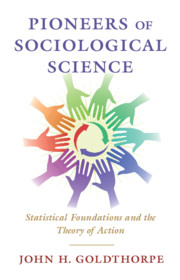Book contents
- Pioneers of Sociological Science
- Pioneers of Sociological Science
- Copyright page
- Dedication
- Contents
- Figures
- Acknowledgements
- Introduction
- 1 The Beginnings
- 2 Quetelet and His Critics
- 3 The English Statisticians
- 4 The Sample Survey Specialists
- 5 Weber and the Concept of Action
- 6 From Columbia to Chicago
- 7 From Chicago back to Columbia
- 8 Duncan and Sociology as a Population Science
- 9 The Return to the Concept of Action and Micro–Macro Relations
- 10 Conclusion
- References
- Index
8 - Duncan and Sociology as a Population Science
Published online by Cambridge University Press: 15 February 2021
- Pioneers of Sociological Science
- Pioneers of Sociological Science
- Copyright page
- Dedication
- Contents
- Figures
- Acknowledgements
- Introduction
- 1 The Beginnings
- 2 Quetelet and His Critics
- 3 The English Statisticians
- 4 The Sample Survey Specialists
- 5 Weber and the Concept of Action
- 6 From Columbia to Chicago
- 7 From Chicago back to Columbia
- 8 Duncan and Sociology as a Population Science
- 9 The Return to the Concept of Action and Micro–Macro Relations
- 10 Conclusion
- References
- Index
Summary
Stouffer was one of the first of Ogburn’s graduate students, Duncan one of the last. Duncan took over most of Ogburn’s views on the requirements for sociological science but his main achievement was to go beyond Ogburn in progressively working out over the course of his career just what kind of science sociology should aim to be: that is, a population science. This idea first emerged in his collaboration with Philip Hauser in editing a large collection of papers, The Study of Population, and was then developed in his research on social stratification and mobility and, in particular, in relation to his methodological contributions, notably path analysis. Duncan saw the role of regression techniques in sociology as a population science not as a means of determining causation but of describing systematic population variability in regard to an outcome of interest. And subsequently, as his interests turned to the use of loglinear models in the analysis of contingency tables, including mobility tables, he again emphasised their descriptive importance in serving to bring out regularities emergent from individual action that were the properties of populations.
Information
- Type
- Chapter
- Information
- Pioneers of Sociological ScienceStatistical Foundations and the Theory of Action, pp. 147 - 165Publisher: Cambridge University PressPrint publication year: 2021
